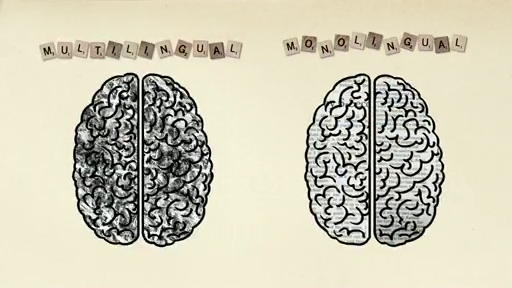É óbvio que conhecer mais de um idioma pode tornar certas coisas mais fáceis, como viajar ou assistir a filmes sem precisar das legendas. Mas existem outras vantagens em ter um cérebro bilíngue (ou multilíngue)? Mia Nacamulli detalha os três tipos de cérebros bilíngues e mostra como conhecer mais de um idioma mantém o seu cérebro mais saudável, complexo e ativamente engajado.
Fonte: TED.COM
| Audio | |
|---|---|
Normal | Slow |
| English Transcript | Tradução |
| ¿Hablas español? | ¿Hablas español? |
| Parlez-vous français? | Parlez-vous français? |
 ? ? |  ? ? |
If you answered, "sí," "oui," or " " and you're watching this in English, chances are you belong to the world's bilingual and multilingual majority. " and you're watching this in English, chances are you belong to the world's bilingual and multilingual majority. | Se você respondeu 'sí', 'oui', ou  e você está assistindo isso em inglês, é provável que você faça parte de uma maioria bilíngue e multilíngue. e você está assistindo isso em inglês, é provável que você faça parte de uma maioria bilíngue e multilíngue. |
| And besides having an easier time traveling or watching movies without subtitles, knowing two or more languages means that your brain may actually look and work differently than those of your monolingual friends. | E além das vantagens ao viajar ou ver filmes sem legendas, saber duas ou mais línguas significa que seu cérebro pode ser e funcionar de modo diferente do que os de seus amigos monolíngues. |
| So what does it really mean to know a language? | Então, o que significa conhecer uma língua? |
| Language ability is typically measured in two active parts, speaking and writing, and two passive parts, listening and reading. | A habilidade de linguagem é medida em duas partes ativas, falar e escrever, e duas partes passivas, ouvir e ler. |
| While a balanced bilingual has near equal abilities across the board in two languages, most bilinguals around the world know and use their languages in varying proportions. | Enquanto um bilíngue equilibrado tem habilidades quase iguais em duas línguas, a maioria dos bilíngues do mundo conhece e utiliza suas línguas em proporções variáveis. |
| And depending on their situation and how they acquired each language, they can be classified into three general types. | E dependendo da situação e como adquiriram cada língua, eles podem ser classificados em três tipos gerais. |
| For example, let's take Gabriella, whose family immigrates to the US from Peru when she's two-years old. | Por exemplo, vamos ver a Gabriela, cuja família imigrou do Peru para os EUA quando ela tinha dois anos de idade. |
| As a compound bilingual, Gabriella develops two linguistic codes simultaneously, with a single set of concepts, learning both English and Spanish as she begins to process the world around her. | Como bilíngue composta, Gabriela desenvolve dois códigos linguísticos simultaneamente, com um único conjunto de conceitos, aprendendo inglês e espanhol enquanto começa a processar o mundo ao seu redor. |
| Her teenage brother, on the other hand, might be a coordinate bilingual, working with two sets of concepts, learning English in school, while continuing to speak Spanish at home and with friends. | Seu irmão adolescente, por sua vez, pode ser um bilíngue coordenado, que trabalha com dois conjuntos de conceitos, aprendendo inglês na escola, enquanto continua falando espanhol em casa e com amigos. |
| Finally, Gabriella's parents are likely to be subordinate bilinguals who learn a secondary language by filtering it through their primary language. | Finalmente, os pais de Gabriela tendem a ser bilíngues subordinados que aprendem uma língua secundária filtrando-a através de sua língua primária. |
| Because all types of bilingual people can become fully proficient in a language regardless of accent or pronunciation, the difference may not be apparent to a casual observer. | Todos os tipos de pessoas bilíngues podem se tornar proficientes em uma língua independentemente do sotaque ou pronúncia, por isso a diferença pode não ser aparente para um observador casual. |
| But recent advances in brain imaging technology have given neurolinguists a glimpse into how specific aspects of language learning affect the bilingual brain. | Mas os avanços recentes na tecnologia de imagem cerebral deram pistas aos neurolinguistas sobre como aspectos do aprendizado de línguas afetam o cérebro bilíngue. |
| It's well known that the brain's left hemisphere is more dominant and analytical in logical processes, while the right hemisphere is more active in emotional and social ones, though this is a matter of degree, not an absolute split. | Sabemos que o hemisfério esquerdo do cérebro é mais dominante e analítico em processos lógicos, enquanto o hemisfério direito é mais ativo em processos emocionais e sociais, embora seja uma questão de grau, não uma separação absoluta. |
| The fact that language involves both types of functions while lateralization develops gradually with age, has lead to the critical period hypothesis. | O fato da linguagem envolver ambos os tipos de funções enquanto a lateralização desenvolve gradualmente com a idade, levou à hipótese do período crítico. |
| According to this theory, children learn languages more easily because the plasticity of their developing brains lets them use both hemispheres in language acquisition, while in most adults, language is lateralized to one hemisphere, usually the left. | De acordo com esta teoria, as crianças aprendem línguas facilmente porque a plasticidade de seus cérebros em desenvolvimento permite que usem os dois hemisférios na aquisição da linguagem, enquanto que para maioria dos adultos, a linguagem está em um hemisfério, geralmente o esquerdo. |
| If this is true, learning a language in childhood may give you a more holistic grasp of its social and emotional contexts. | Se isso for verdade, aprender uma língua na infância pode oferecer uma compreensão mais ampla dos seus contextos sociais e emocionais. |
| Conversely, recent research showed that people who learned a second language in adulthood exhibit less emotional bias and a more rational approach when confronting problems in the second language than in their native one. | Por outro lado, pesquisas recentes mostraram que as pessoas que aprendem uma segunda língua na fase adulta apresentam menos viés emocional e uma abordagem mais racional ao confrontar problemas na segunda língua do que na sua língua nativa. |
| But regardless of when you acquire additional languages, being multilingual gives your brain some remarkable advantages. | Mas não importa quando você adquire línguas adicionais, pois ser multilíngue dá ao seu cérebro algumas vantagens notáveis. |
| Some of these are even visible, such as higher density of the grey matter that contains most of your brain's neurons and synapses, and more activity in certain regions when engaging a second language. | Algumas destas são visíveis, tais como uma densidade maior de matéria cinzenta que contém a maior parte dos neurônios e sinapses do cérebro, e mais atividade em certas regiões ao conversar numa segunda língua. |
| The heightened workout a bilingual brain receives throughout its life can also help delay the onset of diseases, like Alzheimer's and dementia by as much as five years. | O treino intenso que o cérebro bilíngue executa ao longo da vida pode atrasar o surgimento de doenças, como a demência e Alzheimer por até cinco anos. |
| The idea of major cognitive benefits to bilingualism may seem intuitive now, but it would have surprised earlier experts. | A ideia de benefícios cognitivos com o bilinguismo pode parecer intuitiva agora, mas teria surpreendido especialistas do passado. |
| Before the 1960s, bilingualism was considered a handicap that slowed a child's development by forcing them to spend too much energy distinguishing between languages, a view based largely on flawed studies. | Antes da década de 1960, o bilinguismo era considerado uma desvantagem que atrasava o desenvolvimento infantil por forçar a criança a gastar energia diferenciando duas línguas, uma visão baseada em estudos falhos. |
| And while a more recent study did show that reaction times and errors increase for some bilingual students in cross-language tests, it also showed that the effort and attention needed to switch between languages triggered more activity in, and potentially strengthened, the dorsolateral prefrontal cortex. | E enquanto um estudo mais recente mostrou que os tempos de reação e erros aumentam para alguns alunos bilíngues em testes de línguas cruzadas, ele também mostrou que o esforço e atenção necessários para alternar entre línguas gerava mais atividade e reforçava potencialmente o córtex pré-frontal dorsolateral. |
| This is the part of the brain that plays a large role in executive function, problem solving, switching between tasks, and focusing while filtering out irrelevant information. | Esta é a parte do cérebro que desempenha um grande papel na função executiva, resolução de problemas, alternação entre tarefas e na concentração, filtrando informações irrelevantes. |
So, while bilingualism may not necessarily make you smarter, it does make your brain more healthy, complex and actively engaged, and even if you didn't have the good fortune of learning a second language as a child, it's never too late to do yourself a favor and make the linguistic leap from, "Hello," to, "Hola," "Bonjour" or " " because when it comes to our brains a little exercise can go a long way. " because when it comes to our brains a little exercise can go a long way. | O bilinguismo pode não torná-lo mais esperto necessariamente , mas ele torna seu cérebro mais saudável, complexo e ativado, e mesmo se você não tiver a sorte de aprender uma segunda língua quando criança, nunca é tarde para fazer um favor a si mesmo e fazer a linguística mudar de "Olá" para "Hola", "Bonjour" ou " " pois quando se trata de nossos cérebros, um pouco de prática pode nos levar longe. " pois quando se trata de nossos cérebros, um pouco de prática pode nos levar longe. |
Contagem de Palavras
| Freq. | Palavra | Freq. | Palavra | Freq. | Palavra |
|---|---|---|---|---|---|
| 27 | and | 26 | the | 26 | a |
| 19 | in | 18 | of | 16 | language |
| 15 | to | 10 | more | 9 | that |
| 8 | while | 8 | bilingual | 7 | two |
| 7 | languages | 7 | is | 7 | brain |
| 6 | you | 6 | it | 6 | as |
| 5 | your | 5 | when | 5 | this |
| 5 | their | 5 | may | 5 | learning |
| 4 | with | 4 | second | 4 | can |
| 4 | be | 3 | types | 3 | some |
| 3 | recent | 3 | or | 3 | on |
| 3 | not | 3 | most | 3 | make |
| 3 | if | 3 | hemisphere | 3 | have |
| 3 | english | 3 | emotional | 3 | by |
| 3 | but | 3 | both | 3 | bilingualism |
| 3 | between | 3 | because | 3 | are |
| 2 | years | 2 | world | 2 | who |
| 2 | watching | 2 | use | 2 | too |
| 2 | they | 2 | them | 2 | than |
| 2 | spanish | 2 | social | 2 | so |
| 2 | showed | 2 | regardless | 2 | people |
| 2 | parts | 2 | one | 2 | multilingual |
| 2 | much | 2 | matter | 2 | linguistic |
| 2 | left | 2 | learn | 2 | know |
| 2 | it's | 2 | its | 2 | into |
| 2 | how | 2 | her | 2 | has |
| 2 | gabriella | 2 | from | 2 | friends |
| 2 | for | 2 | filtering | 2 | even |
| 2 | does | 2 | develops | 2 | concepts |
| 2 | brain's | 2 | brains | 2 | bilinguals |
| 2 | around | 2 | an | 2 | also |
| 2 | activity | 2 | active | 1 | yourself |
| 1 | you're | 1 | writing | 1 | would |
| 1 | world's | 1 | workout | 1 | working |
| 1 | work | 1 | without | 1 | whose |
| 1 | what | 1 | well | 1 | way |
| 1 | was | 1 | visible | 1 | view |
| 1 | varying | 1 | usually | 1 | us |
| 1 | typically | 1 | true | 1 | triggered |
| 1 | traveling | 1 | times | 1 | time |
| 1 | throughout | 1 | through | 1 | three |
| 1 | though | 1 | those | 1 | these |
| 1 | theory | 1 | tests | 1 | teenage |
| 1 | technology | 1 | tasks | 1 | take |
| 1 | synapses | 1 | switching | 1 | switch |
| 1 | surprised | 1 | such | 1 | subtitles |
| 1 | subordinate | 1 | study | 1 | studies |
| 1 | students | 1 | strengthened | 1 | split |
| 1 | spend | 1 | specific | 1 | speaking |
| 1 | speak | 1 | solving | 1 | smarter |
| 1 | slowed | 1 | situation | 1 | single |
| 1 | simultaneously | 1 | show | 1 | she's |
| 1 | she | 1 | sets | 1 | set |
| 1 | seem | 1 | secondary | 1 | school |
| 1 | s | 1 | role | 1 | right |
| 1 | research | 1 | remarkable | 1 | regions |
| 1 | receives | 1 | really | 1 | reading |
| 1 | reaction | 1 | rational | 1 | proportions |
| 1 | pronunciation | 1 | proficient | 1 | processes |
| 1 | process | 1 | problems | 1 | problem |
| 1 | primary | 1 | prefrontal | 1 | potentially |
| 1 | plays | 1 | plasticity | 1 | peru |
| 1 | period | 1 | passive | 1 | part |
| 1 | parents | 1 | out | 1 | our |
| 1 | other | 1 | onset | 1 | ones |
| 1 | old | 1 | observer | 1 | now |
| 1 | never | 1 | neurons | 1 | neurolinguists |
| 1 | needed | 1 | necessarily | 1 | near |
| 1 | native | 1 | movies | 1 | monolingual |
| 1 | might | 1 | measured | 1 | means |
| 1 | mean | 1 | majority | 1 | major |
| 1 | look | 1 | long | 1 | logical |
| 1 | little | 1 | listening | 1 | likely |
| 1 | like | 1 | life | 1 | let's |
| 1 | lets | 1 | less | 1 | learned |
| 1 | leap | 1 | lead | 1 | lateralized |
| 1 | lateralization | 1 | late | 1 | largely |
| 1 | large | 1 | known | 1 | knowing |
| 1 | irrelevant | 1 | involves | 1 | intuitive |
| 1 | information | 1 | increase | 1 | immigrates |
| 1 | imaging | 1 | idea | 1 | hypothesis |
| 1 | home | 1 | holistic | 1 | higher |
| 1 | hemispheres | 1 | help | 1 | heightened |
| 1 | healthy | 1 | having | 1 | handicap |
| 1 | hand | 1 | grey | 1 | grasp |
| 1 | gradually | 1 | good | 1 | go |
| 1 | glimpse | 1 | gives | 1 | given |
| 1 | give | 1 | general | 1 | gabriella's |
| 1 | functions | 1 | function | 1 | fully |
| 1 | fortune | 1 | forcing | 1 | focusing |
| 1 | flawed | 1 | five | 1 | finally |
| 1 | favor | 1 | family | 1 | fact |
| 1 | experts | 1 | exhibit | 1 | exercise |
| 1 | executive | 1 | example | 1 | errors |
| 1 | equal | 1 | engaging | 1 | engaged |
| 1 | energy | 1 | effort | 1 | easily |
| 1 | easier | 1 | earlier | 1 | each |
| 1 | dorsolateral | 1 | dominant | 1 | do |
| 1 | distinguishing | 1 | diseases | 1 | differently |
| 1 | difference | 1 | didn't | 1 | did |
| 1 | development | 1 | developing | 1 | depending |
| 1 | density | 1 | dementia | 1 | delay |
| 1 | degree | 1 | cross | 1 | critical |
| 1 | cortex | 1 | coordinate | 1 | conversely |
| 1 | continuing | 1 | contexts | 1 | contains |
| 1 | considered | 1 | confronting | 1 | compound |
| 1 | complex | 1 | comes | 1 | cognitive |
| 1 | codes | 1 | classified | 1 | child's |
| 1 | children | 1 | childhood | 1 | child |
| 1 | chances | 1 | certain | 1 | casual |
| 1 | brother | 1 | board | 1 | bias |
| 1 | besides | 1 | benefits | 1 | belong |
| 1 | being | 1 | begins | 1 | before |
| 1 | become | 1 | based | 1 | balanced |
| 1 | attention | 1 | at | 1 | aspects |
| 1 | approach | 1 | apparent | 1 | answered |
| 1 | analytical | 1 | alzheimer's | 1 | all |
| 1 | age | 1 | affect | 1 | advantages |
| 1 | advances | 1 | adults | 1 | adulthood |
| 1 | additional | 1 | actually | 1 | actively |
| 1 | across | 1 | acquisition | 1 | acquired |
| 1 | acquire | 1 | according | 1 | accent |
| 1 | absolute | 1 | ability | 1 | abilities |









